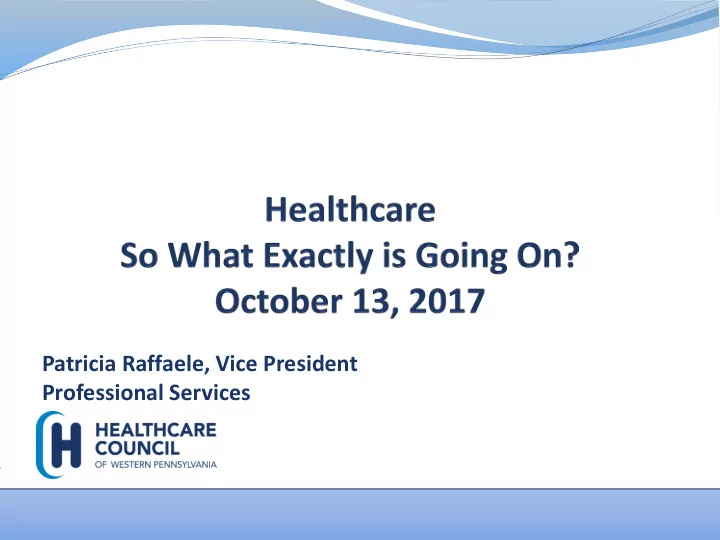

Patricia Raffaele, Vice President Professional Services
Highlights The ACA-What’s Going On? -CHIP Reauthorization -Open Enrollment -Executive Orders The ACA-What’s Next? Other Topics
ACA: What Happened Two repeal bills did not pass The first bill passed the House in July The Senate had a vote to determine if the process should go forward to repeal ACA The Senate voted “yes”
ACA: What Happened? Hurried Negotiations A bill was offered that would repeal parts of the ACA The Senate defeated the proposed bill Three vote margin: Sen. John McCain (AZ) cast the decisive vote The vote occurred at 1:30 a.m. on July 27th
ACA: What Happened? Then the “skinny repeal” bill-called the Health Care Freedom Act was introduced-did not pass -Senate could not find a bill that satisfied moderates and conservatives in the Republican Caucus -A “vehicle” to negotiate with the House -Would have ended the “individual mandate” -No incentives for people to get coverage’
What’s Next?
ACA: What’s Next? Something Bipartisan? Smaller pieces of legislation that are bipartisan The “Governor’s Plan” –bipartisan approach (included PA) Major changes in Medical Assistance: block grant or capitated program
ACA: What’s Happening The Governors’ Plan: Flexibility for states States include: PA, Ohio, Colorado, Nevada, Alaska, Virginia, Louisiana, Montana
ACA: What’s Happening The Governors’ Plan Fund cost-sharing payments through 2019 Fund for states to create reinsurance programs Tax exemptions for insurance carriers in underserved counties Retention of individual mandate until there is a new alternative
And . . .
Something Magical?
What’s Just Happened Executive Order on Health Insurance Expands association plans-will rewrite federal rules which govern these plans (Treasury, Labor, HHS) Similar program before-called Multiple Employer Welfare Arrangements-stopped in 1992 Widespread problems reported by states, more than $123 million in unpaid claims “Association” plans-refer to associations such as the Chamber of Commerce, etc. buying “group” insurance
Executive Order Plans will probably not have to comply with the 10 “essential health benefits” Plans will probably not have to accept all applications at the same rates without regards to preexisting conditions Individuals will be allowed to buy short term plans up to 364 days (under ACA it is 90 days) Employers will be able to use pretax dollars in “health reimbursement arrangements” to help workers pay for any medical expenses (not just those related to ACA rules) May be more expensive for those with serious medical conditions to buy health insurance More insurers may leave the marketplace “This is just the beginning” (rules need rewritten, possible court challenges)
What’s Next?
CHIP CHIP Reauthorization Didn’t Happen Congress needed to act by Sept. 30 th Advocates asked for “clean” reauthorization (no connection to ACA or Medicaid cuts) PA Bipartisan Support Covers 176,000 children in PA, 8.6 million children nationwide PA has funds to cover CHIP until February Some states already ran out of money-received redistribution of CHIP funding for a short-term fix Program is authorized through Oct. 1, 2019 but legislation is needed to continue the program and the funding There is a bill in both the Senate and the Health
In the Meantime. . Open Enrollment November 1, 2017-December 15, 2017 Navigators are still funded, budgets cut Less Education and Outreach funding from CMS Certified Navigators throughout western PA Healthcare Council’s Certified Navigator: Barb McDowell Funded through CMS Grant given to Consumer Health Coalition and grants from local foundations Still can conduct special enrollments ACA is still the law: individual mandates, etc.
And who is Don Wright, M.D.? New Secretary of Health and Human Services Formally acting assistant secretary for health since February Joined the agency in 2017 under President Bush Board certified in Family Medicine and Preventive Medicine Also served in the Department of Labor as director of the Office of Occupational Medicine Has a master’s degree in Public Health
And more . . 340(B) Drug Program CMS wants to cut reimbursement for this drug program that benefits those on Medicaid and Medicare Hearing held on October 11 by House Energy and Commerce Subcommittee Subcommittee on Oversight and Investigations Hospitals and health centers testified in support of the program Opioid Crisis Hearing held October 11 by House Energy and Commerce Subcommittee on Health Major issue in western PA/West Virginia/Ohio
Other Factors Executive Order on Regulatory Reform Telemedicine and Telehealth Quality Initiatives Bundled Payments PA Budget Changes in Medical Assistance
Impact on Region’s Hospitals Trend in lower operating margins Region’s hospitals see most admissions from Medicare and Medicaid covered patients-70 percent Already low reimbursement Any additional funding cuts to those programs would have a large negative impact on hospitals
Resources For Enrollment Information: Healthcare Council of Western PA: www.hcwp.org Consumer Health Coalition: www.chc.org For Daily Policy Updates: Washington Post: Health Daily 202 For Hospital Policy Positions: American Hospital Association: www.aha.org Hospital and Healthsytem Association of PA: www.haponline.org
Questions
Thank You Patricia Raffaele Vice President, Professional Services Healthcare Council of Western PA raffaelp@hcwp.org 724/772-7202 www.hcwp.org
Recommend
More recommend